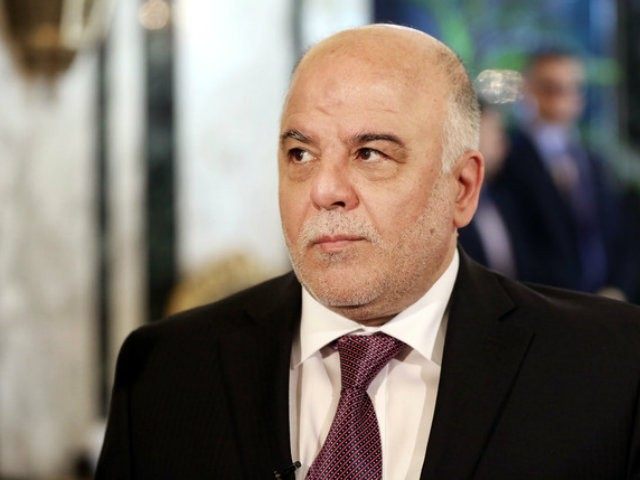The Prime Minister of Iraq, Haider al-Abadi, took to Twitter on Tuesday to condemn the Turkish government for participating in a “dangerous escalation” of violence against Kurdish targets in northern Iraq, after announcing they would limit their attacks to creating an “anti-ISIS” zone in the Syrian heartland.
“Council of Ministers considers Turkish airstrikes on Iraqi territory a dangerous escalation and a violation of Iraq’s sovereignty,” Al-Abadi wrote on his account, calling for the Turkish military to refrain from violating Iraqi airspace:
Turkey began its most powerful airstrikes in Iraq since operations began on Wednesday, the Wall Street Journal reports, hitting at least six Kurdish targets in northern Iraq and organizing a special parliament session to discuss a continuation of this military operation. There is no indication Turkey consulted with the Shiite government of Baghdad before engaging in the current airstrikes, which have been targeting the north of the country largely populated by Yazidis and Kurds.
The Turkish government announced last week that it would, for the first time, engage in airstrikes against the Islamic State in Syria, following a suicide bombing in the border town of Suruç that left 32 dead, mostly Kurds organizing to help rebuild the battered border town of Kobani, Syria, which lies across the border from Suruç. The United States and Turkey agreed to engage in a military action that would create an “anti-ISIS” buffer zone in Syria, and the Turkish government arrested more than one thousand people believed to have ties to terror groups.
As of police estimates released when the raids began on Monday, however, only 15 of those arrested are confirmed to have been detained for having ties to the Islamic State terrorist group. It is believed that most of the arrests targeted members or affiliates of the Kurdistan Workers’ Party (PKK), a Marxist US-designated terrorist group stridently opposed to the Islamic State, and conducting military operations in tandem with Kurdish People’s Protection Units (YPG/YPJ) against ISIS in Syria.
Similarly, the airstrikes conducted by Turkish force in Iraq seem to be almost exclusively targeting Kurdish strongholds, not ISIS strategic targets. Those have apparently been left to U.S. troops.
The United States distanced itself from the airstrikes against the PKK this week. “There is no connection between these airstrikes against PKK and recent understandings to intensify U.S.-Turkey cooperation against ISIL,” tweeted Brett McGurk, the deputy special presidential envoy for the coalition to counter ISIL. While the United States still considers the PKK a terrorist group, there is no evidence that American resources are being used in this campaign.
It is not known whether the Turkish government has consulted the other major Kurdish entity in Iraq, the Kurdistan Regional Government headquartered in Erbil, on the airstrikes in Iraq. It is known, though, that Kurdish President Masoud Barzani did discuss airstrikes in Syria with Turkish Prime Minister Ahmet Davutoglu.
Barzai issued a statement on Monday condemning the PKK for “arrogant” behavior towards the Turks’s “positive attitude” toward them, and the Kurdistan Regional Government has previously been loudly opposed to a PKK presence in their territory. Had the Turkish government approached Barzani regarding the airstrikes without addressing Al-Abadi in Baghdad, the increasingly marginalized Shiite Iraqi government may feel even further snubbed by the international community.

COMMENTS
Please let us know if you're having issues with commenting.